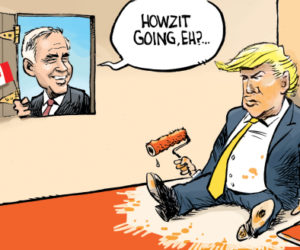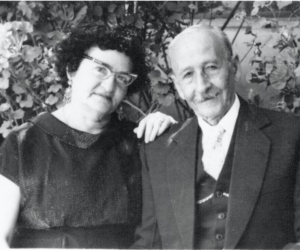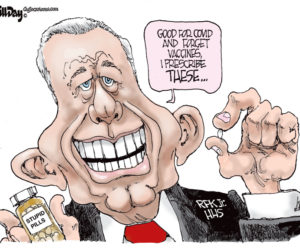Claire McCaskil, a supporter of Hillary Clinton, claimed that Bernie Sanders is, “is too liberal to gather enough votes in this country to become president” on Morning Joe. Sanders replied in an interview with Bloomberg News:
“To the best of my knowledge, this is the first time that a colleague has attacked me,” said Sanders, a Vermont socialist who joined the presidential race about two months ago, in an interview with Bloomberg Politics’ Mark Halperin and John Heilemann. “You’ll have to ask Senator McCaskill why.”
“Do I believe, in opposition to Senator McCaskill, that we need trade policies that are fair to the American worker, and not just benefit CEOs and large corporations?” Sanders said. “I plead guilty.”
Sanders said he “absolutely” believes in a single-payer health care system and opposes the Trans-Pacific Partnership.
McCaskill is wrong in saying that Sanders is too liberal. The real problem is that Hillary Clinton is too conservative. As I discussed last week, Sanders’ views are becoming mainstream. Sanders contrasted his views with those of Hillary Clinton when interviewed by Diane Rehm two weeks ago, with excerpts posted here.
McCaskill also complained that the media has given Sanders a pass in not mentioning he is a socialist, but this has been constantly noted in media coverage. Actually he calls himself a Democratic Socialist, with views more similar to European Social Democrats than hard-core socialists. Sanders has not only supported a role for the private enterprise, his policies in Burlington turned out to be quite favorable for business growth. He discussed his economic views with MSNBC last month:
I think there is obviously an enormously important role for the free market and for entrepreneurial activity. I worry how free the free market is. In sector after sector, you have a small number of companies controlling a large part of the sector.
Certainly, in my view, the major banks should be broken up. We want entrepreneurs and private businesses to create wealth. No problem. But what we’re living in now is what I would call—what Pope Francis calls—a casino-type capitalism, which is out of control, where the people on top have lost any sense of responsibility for the rest of the society. Where it’s just “It’s all me. It’s all me. And to heck with anybody else.” I want to see the result of that wealth go to the broad middle class of this country and not just to a handful of people.
No, Sanders is not too liberal. Clinton is too conservative. In February Truth-Out had a post on Five Reasons No Progressive Should Support Hillary Clinton, which is worth reading–and there are several more reasons besides what is in that article.
Besides the economic differences which have dominated the campaign so far, it was Sanders who, reviewing the same intelligence as Hillary Clinton, voted against the Iraq war. Hillary Clinton not only voted for the war, she went to the right of other Democrats who voted to authorize force in falsely claiming there was a connection between Saddam and al Qaeda. She showed she did not learn from her mistake when she continued to advocate for increased military intervention as Secretary of State. Voters deserve a real choice in the general election on the future direction of our foreign policy, which we will not have in a contest between Hillary Clinton and virtually any Republican.
In an era when the nation is becoming more liberal on social issues, Hillary Clinton’s long-standing conservatism on social/cultural issues also make her too conservative to be the Democratic nominee. This was seen when she was in the Senate when she was a member of The Fellowship, being influenced on social issues by religious conservatives such as Rick Santorum, Sam Brownback, and Joe Lieberman. Clinton’s affiliation with the religious right was seen in her support for the Workplace Religious Freedom Act , a bill introduced by Rick Santorum and opposed by the American Civil Liberties Union for promoting discrimination and reducing access to health care, along with her promotion of restrictions on video games and her introduction of a bill making flag burning a felony. Her social conservatism is also seen in her weak record on abortion rights, such as supporting parental notification laws and stigmatizing women who have abortions with the manner in which she calls for abortion to be “safe, legal and rare.” Until last year she continued to argue that gay marriage should be up to the states, only recently recognizing it as a right.
Clinton has disappointed environmentalists in supporting fracking and off-shore drilling. Her views on the Keystone XL Pipeline is just one of many controversial issues where Clinton has refused to give her opinion. The vast amounts of money she has received from backers of the pipeline lead many environmentalists to doubt that Clinton can be counted on to oppose the pipeline, or take any positions contrary to the wishes of the petroleum industry.
Bernie Sanders voted against the Patriot Act while Clinton supported it. Sanders has spoken out against the illegal NSA surveillance while Clinton has remained quite, and has an overall poor record on civil liberties. Clinton’s failures to archive her email as required when she was Secretary of State and disclose donations to the Clinton Foundation as she had agreed to are just the latest examples of her long-standing hostility towards government transparency.
Hillary Clinton personifies everything which has been wrong about the Democratic Party. This lack of standing up for principle by Democrats is also probably a major reason why the Republicans dominate in Congress and many state governments. When Democrats hide from liberal principles, they do not give potential Democratic voters a reason to turn out to vote.
Besides interviewing Sanders about McCaskill’s attack, Bloomberg also reported that Sanders is gaining on Clinton in Iowa and New Hampshire. A WMUR/CNN poll shows the race to be even tighter in New Hampshire:
Less than two months ago, former Secretary of State Hillary Clinton held a 21 percentage point lead over her nearest competitor in the New Hampshire Democratic presidential primary campaign. Now, her edge is down to 8 percentage points over Vermont U.S. Sen. Bernie Sanders.
Polls on primary races have historically changed considerably due to people not paying attention early and changes as the campaign progress. Primary voters are far more likely to be persuaded to change their support when choosing among members of their own party than people are likely to be persuaded to vote for candidates of the other party in a general election. Historically voters in Iowa have not made up their minds until just prior to voting, and even a poll from a week earlier is liable to change. An eight point, or even larger margin, can disappear overnight. Results in subsequent states tend to also change rapidly as results from earlier states are available. If Sanders, or another liberal challenger, can upset Clinton in Iowa, or perhaps only keep it close, they are likely to see a considerable bounce going into subsequent primary battles. Clinton still maintains a lead, but is no longer the inevitable candidate.
Originally posted at Liberal Values
















